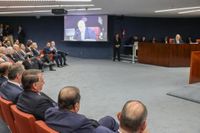On March 25, 2025, the First Panel of the Brazilian Supreme Federal Court (STF) commenced a high-stakes trial determining whether to accept charges against former President Jair Bolsonaro and seven associates for their alleged roles in a coup attempt following the elections of President Luiz Inácio Lula da Silva in 2022.
The Attorney General's Office (PGR) has accused Bolsonaro of leading a criminal organization that undertook actions undermining democracy. If accepted, the charges could encompass a spectrum of severe offenses, potentially leading to years of imprisonment for the defendants.
The five ministers of the First Panel are tasked with deciding whether to formally bring these allegations to trial. Among the accused, Bolsonaro faces charges of five distinct crimes, including:
- Abolition of the Violent Democratic Rule of Law: This involves attempts, through violence or threats, to disrupt the constitutional order. Penalties can range from 4 to 8 years of imprisonment.
- Coup d'État: Defined as efforts to forcibly depose the legally elected government, this carries a possible prison sentence between 4 and 12 years.
- Criminal Organization: Collaborating with others to commit crimes can result in sentences between 3 and 8 years.
- Qualified Damage: This refers to the destruction of another's property under threat, with penalties of 6 months to 3 years.
- Deterioration of Listed Heritage: Engaging in harmful conduct against properties protected by law can lead to penalties ranging from 1 to 3 years.
As these proceedings unfold, public anticipation remains high. The implications of the trial are profound, as a conviction could see not only imprisonment but also broader consequences for the accused, including the loss of political offices and eligibility for future elections.
Security measures have been heightened in response to the perceived risks associated with such a politically charged trial. The STF has coordinated closely with the Federal District's Public Security Secretariat to ensure a secure environment during the hearings, which include special police presence and stringent access controls.
The session's proceedings were transmitted live, reflecting the heightened public interest and historical significance of the events. Various channels, including TV Justiça and platforms associated with the Workers' Party (PT), aired the hearings starting from 9:30 am, aiming to provide comprehensive coverage to a national audience.
Notably, this trial features not only Bolsonaro but also several of his former ministers, including Walter Braga Netto, Anderson Torres, Augusto Heleno, and Paulo Sérgio Nogueira, along with key military figures like former Navy commander Almir Garnier Santos and former Intelligence Agency director Alexandre Ramagem.
The current structure of the proceedings involves detailed legal arguments, with Minister Alexandre de Moraes serving as the lead speaker, followed by the Attorney General, and subsequently the defendants' lawyers. Following their statements, the ministers will deliberate on the acceptance of the complaint, with a potential follow-up session scheduled if needed.
The charges stem from actions purportedly taken after Lula's election victory, which include organizing efforts to reclaim power through non-democratic means. Observers note that acceptance of these charges would mark a significant moment in Brazilian history, emphasizing accountability at the highest levels of government.
In commentary on the matter, a representative from the PT remarked, “This is a historic situation that we need to cover as comprehensively as possible,” highlighting the political ramifications of the trial. Their live broadcasts aim to capture all dimensions of this unfolding drama, ensuring the public remains informed.
The outcome of this trial could resonate beyond the courtroom, potentially reshaping Brazil's political landscape and influencing future governance. The ramifications of judicial decisions often extend into societal perceptions of democratic integrity and justice.
As this case progresses, observers both in Brazil and worldwide are keenly watching how the judicial system will handle allegations against a former head of state—a situation fraught with political intrigue and potential consequences for the nation's governance.
With the trial now commenced, the stage is set for intense scrutiny of both the evidence presented and the legal interpretations that will ultimately determine the fate of Bolsonaro and his co-defendants. The following weeks will likely illuminate not only the intricacies of the case but also Brazil's ongoing struggle with its democratic principles and the rule of law.



